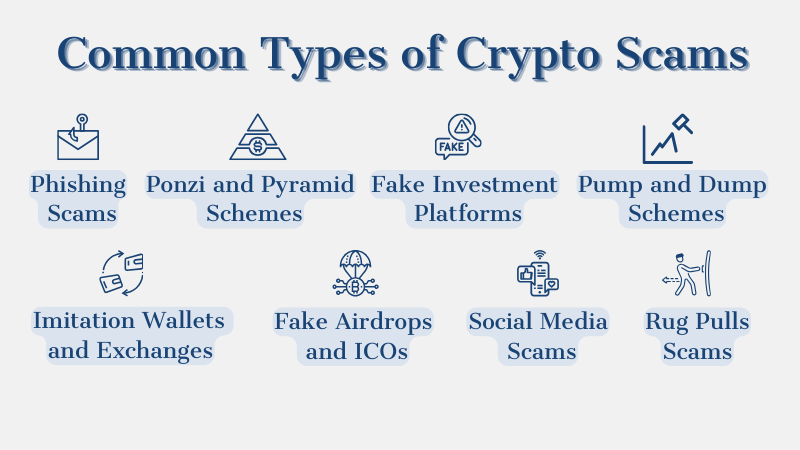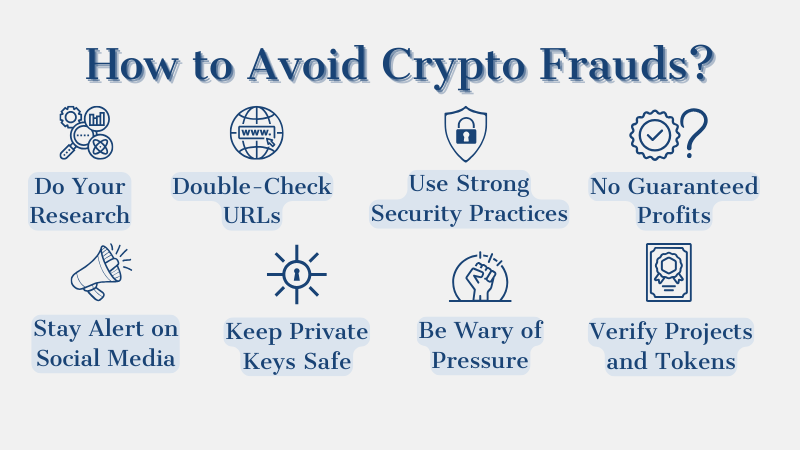Crypto scams are tricks used to steal people’s digital money or personal details. Fake investment platforms and phishing scams are common threats. So, you should learn to spot them if you want to keep your crypto safe.
In this article, we will explore the different types of cryptocurrency scams and share tips on spotting and avoiding them.
Common Types of Crypto Scams
Below, we will talk about the different types of cryptocurrency scams.
Phishing Scams
Imagine you get an email that looks like it’s from your crypto wallet provider, asking you to click a link to “secure your account.” You click and enter your login details, and suddenly, your funds are gone. That’s a phishing scam.
These fake emails or websites trick you into sharing your wallet keys or login details. Always double-check the website address and avoid clicking on suspicious links.
If an email looks urgent or too good to be true, think twice and visit the official website directly.
The biggest crypto scam example is Binance Phishing Scams. Scammers impersonated Binance, one of the largest crypto exchanges, to trick users into sharing sensitive information.
Ponzi and Pyramid Schemes
These scams work like this: You’re promised huge profits if you invest early. You may even see others getting paid, but only because new investors’ money is being used to pay the old ones. When the scam can’t find more new people, it collapses.
Think of it like a chain where each link depends on the next one joining. If the chain breaks, everyone loses. Be cautious of schemes that focus on recruiting more members or promise “guaranteed returns.”
BitConnect stands as one of the largest crypto scams in history. It promised high returns but collapsed in 2018, leaving investors with billions in losses.

Fake Investment Platforms
You find a website that looks professional and promises to grow your money quickly. You invest, but when you try to withdraw your funds, the website either blocks you or disappears. These platforms are designed to look trustworthy but are made to steal your money.
Before you invest, always check for reviews and research the platform’s background.
PlusToken is one of the largest scam examples in crypto history. Operating as a fake wallet service, it stole over $2 billion from unsuspecting users.
Pump and Dump Schemes
Imagine a group of people online telling everyone to buy a cheap coin because it’s about to “skyrocket.” You buy in, but just as the price rises, the scammers sell off their coins, and the value crashes. You’re left with a worthless investment.
Be careful of sudden hype about unknown cryptocurrencies, especially on social media.
Wolf of Wall Street–Style Scams — Groups organized online to pump up the price of small cryptocurrencies, then sold off quickly.
Imitation Wallets and Exchanges
You download a wallet app that looks legitimate but is actually fake. When you store your coins or share your private keys, the scammers take your funds. Always download apps from official sources and double-check the app’s name and developer.
If the app has few downloads or poor reviews, it’s best to stay away.
A major crypto scam used fake Trezor wallet apps. These apps tricked users into sharing their private keys, allowing scammers to steal their funds.
Fake Airdrops and ICOs
You come across a promise of free coins if you pay a small fee or share your wallet details. The scammers collect your payment or data and disappear. Sometimes, they promote fake Initial Coin Offerings (ICOs) to attract investment.
If an offer sounds too good to be true, it usually is. Always research before participating.
Social Media Scams
A celebrity or crypto influencer’s account posts about a giveaway, claiming to double any crypto you send. These are usually fake profiles made to scam you. Real giveaways never ask you to send money first.
Even if it looks like your favorite influencer, double-check the profile, and remember: don’t send money expecting to get more back.
The Elon Musk X Scam was a crypto fraud where hackers used verified X accounts to impersonate Elon Musk and trick people into sending Bitcoin with fake promises.
Rug Pulls
A new crypto project or token gains lots of attention, promising great returns. You invest, but soon, the creators abandon the project and disappear with all the funds. This scam is common in the world of new tokens and decentralized finance (DeFi).
If a project has little information about who is behind it or if the team is anonymous, be extra careful.
Squid Game Token—A crypto project inspired by the popular show “Squid Game” turned out to be a scam, and the creators vanished with millions of dollars.
How to Spot Cryptocurrency Scams?
Scammers always look for ways to trick people out of their money, but there are simple signs to watch for.
- Be careful if someone promises you huge profits with no risk. In crypto, there are no guaranteed returns.
- If an offer sounds unbelievable or too perfect, it probably is. Scammers use big claims to catch your attention.
- Check if the website or app is secure and genuine. Be careful with sites that look slightly off or apps that ask for private keys.
- If someone is pushing you to make a quick decision, take a step back. Scammers often create urgency to stop you from thinking.
- Be suspicious if anyone asks for your wallet keys or passwords. Real companies never ask for these details.
- Scammers may pretend to be famous people to gain your trust. Always double-check if the person is real.
How to Avoid Crypto Frauds?
Do Your Research
Before investing in any crypto project, look into the background of the company or people involved. Check reviews and ensure the platform has a solid reputation.
Double-Check URLs
Always verify that you’re on the official website of your crypto wallet or exchange. Scammers often create websites that look almost identical to the real ones.
Use Strong Security Practices
Enable two-factor authentication (2FA) on your accounts, use strong passwords, and never share your private keys with anyone.
Beware of Promises of Guaranteed Returns
Be suspicious of anyone promising huge profits with no risk. In crypto, high returns often come with high risk.
Stay Alert on Social Media
Be cautious of giveaways or investment tips on social media. Verify if the account is legitimate, and remember that real giveaways never ask you to send money first.

Keep Your Private Keys Safe
Store your private keys offline, and never share them with anyone. Use hardware wallets for added security.
Be Wary of Urgency and Pressure
Scammers often try to make you act quickly. Take your time to think and research before making any decisions.
Verify Projects and Tokens
If you’re interested in a new cryptocurrency or ICO, check if it’s listed on reputable sites and look for details about the project and its team.
What to Do If You Discover a Cryptocurrency Scam?
Now, we will talk about what to do if you come across a crypto scam.
- If you suspect you’re dealing with scammers, immediately cut off any interaction. Do not share any more information or send any funds.
- Inform your local authorities and report the scam to financial regulatory bodies. In the U.S., you can use the Federal Trade Commission (FTC) or report phishing scams to the Anti-Phishing Working Group.
- Spread the word to friends, online communities, or social media to prevent others from falling victim. Awareness is a powerful tool against scammers.
- If you believe your funds are at risk, reach out to your crypto exchange or wallet service immediately. They may be able to freeze your account or trace the stolen funds.
- Change all your passwords and enable two-factor authentication (2FA) on every crypto-related account. If your private keys have been exposed, transfer your funds to a more secure wallet.
- Monitor your accounts for any unusual activity. Keep a close watch to ensure your assets remain safe.
Conclusion About Crypto Scams
Crypto scams are common, but you can stay safe by being cautious and informed. Watch out for scams like phishing emails asking for your private keys or fake websites that look real.
For example, if you get an email pretending to be from Binance, never click links without checking if they are genuine. Be careful of promises of huge profits, like Ponzi schemes, where old investors get paid with money from new ones.
If something sounds too good to be true, it probably is. Always double-check everything, stay alert, and protect your crypto investments.
FAQs About Crypto Scams
What are crypto scams?
Crypto scams are schemes designed to steal your digital money or private information. Common cryptocurrency scams include fake investment sites, phishing attacks, and scammers pretending to be celebrities.
What types of crypto scams should I watch out for?
Watch out for scams like phishing, Ponzi schemes, fake investment platforms, and rug pulls. These crypto frauds are meant to trick you into losing money or sharing sensitive details.
What are the biggest crypto scams in history?
Some of the biggest crypto scams include BitConnect, which caused billions in losses, and PlusToken, which stole over $2 billion. These biggest crypto scams show the risks of unverified investments.
How can I avoid cryptocurrency scams?
To avoid cryptocurrency scams, always research thoroughly, use secure wallets, and never share private keys. Be cautious of offers promising guaranteed returns and avoid suspicious links.
Who is the biggest crypto scammer?
The biggest crypto scammers are behind scams like BitConnect and OneCoin, which defrauded thousands of people. These big crypto scams highlight the importance of careful research before investing.